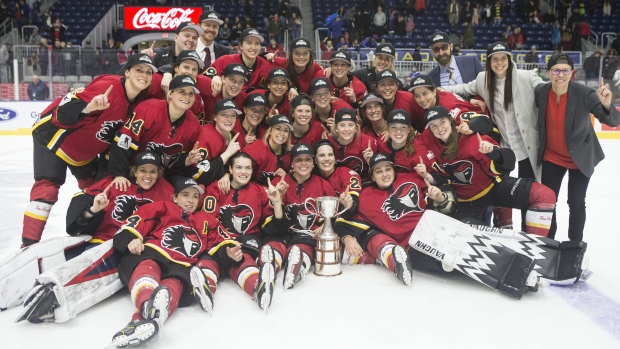Apr 4, 2019
Hefford: 'It’s a pivotal time for the women’s game'
When the CWHL announced that it will cease operations effective May 1, the reasoning behind the decision came down to the economic model being unsustainable. According to Jayna Hefford, CWHL interim commissioner, there are a few reasons why the business model wouldn't last.
TSN.ca Staff

When the CWHL announced that it will cease operations effective May 1, the reasoning behind the decision came down to the economic model being unsustainable. According to Jayna Hefford, CWHL interim commissioner, there are a few reasons why the business model wouldn't last.
“I have to start by saying it has worked in the past and we’ve had 12 years of growth and this model was successful in doing that, said Hefford. “But as we look to the future, there are a few reasons it’s not. One (reason) being not-for-profit with RCAAA status, which is amateur athletics. We can never get to the point that we can pay beyond a stipend and in our minds to advance the game, these players deserve so much more than that.”
“Secondly, we weren’t finding the support in the marketplace and we rely on revenues from ticket sales, merchandise, corporate sponsorships and donations. When we looked at our revenues and our expenses, we weren’t getting the support we needed in that capacity to continue to advance the game moving forward.”
The announcement came a week after the Calgary Inferno won the Clarkson Cup trophy as a record 175,000 fans tuned in to watch the championship game.
Founded in 2007, the CWHL operates like the MLS where the league owns the teams, which featured six teams in 2018-19. It began paying its players in 2017-18 from a total budget of $3.7 million.
However, in November the league lost a major financial backer when longtime sponsor Graeme Roustan withdrew the sponsorship of his venture capital firm Roustan Capital.
Hefford is optimistic about the future of the women’s game but it’s difficult to forecast what’s next.
“It’s hard to speculate on what may be coming ahead, Hefford said. “I think the first thing is for us, we hope that these organizations, and there’s been many of them, who have supported the game or said they support the game and have expressed a desire to see the game grow.”
“Our hope is that they’ll step up in real actionable ways to make a difference and I’m optimistic about the future. I think it’s a pivotal time for the women’s game, we’re at a fork in the road and if we want to continue to advance the sport, sometimes hard decisions have to be made.”
